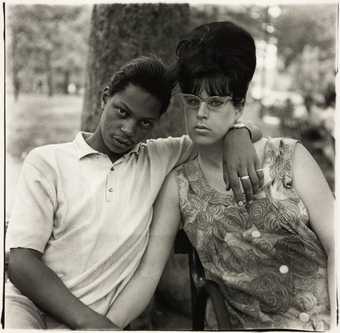Diane Arbus is considered one of the great figures of American photography. A pioneer of the social documentary form that blurred the line between art and reportage, her profoundly original works record the astonishing variety of attitudes, emotions, and appearances to be found among the people around us.
Arbus was fascinated by the diversity of human life, creating psychologically acute portraits of astonishing intimacy. Her images of children, circus performers, nudists, middle-class families, couples, eccentrics, and celebrities are united by their sometimes-shocking directness. This frank, unflinching approach reflects Arbus’s method, which relied upon a sense of trust between the artist and sitter.
Born in 1923 in New York, Arbus studied photography during the 1940s and ‘50s, and her first published photograph appeared in Esquire in 1960. She began making portraits in the early 1960s.
Tracing the development of Arbus’ early work with a 35mm camera from the mid-1950s to the distinctive square format she began using in 1962, the exhibition will include a presentation of A Box of Ten Photographs, a rare portfolio of original prints which Arbus produced shortly before her death by suicide in 1971. Arbus gave considerable thought to what this portfolio should be and how it should look, selecting a set of ten images that date from as early as 1963, comprising some of her most iconic portraits, including Identical twins, Roselle, N.J. 1966 and A Jewish giant at home with his parents in the Bronx, N.Y. 1970. For Arbus, the ten images represented who she was as an artist and how she saw her work in the world, a legacy that became more solidified with her death in 1971.
Over the course of her career, she produced a remarkable body of work, wide-ranging in its content, but consistent in its powerfully direct style, often praised as a ‘celebration of things as they are’.








